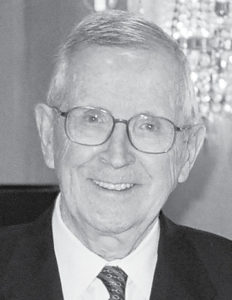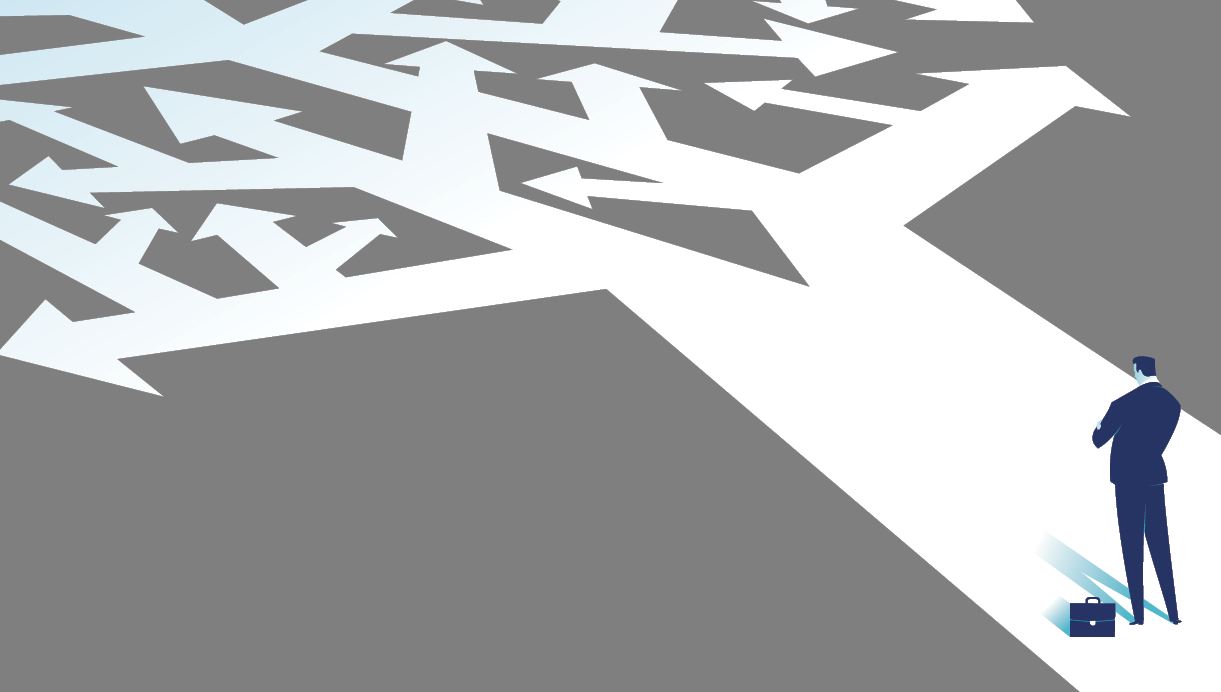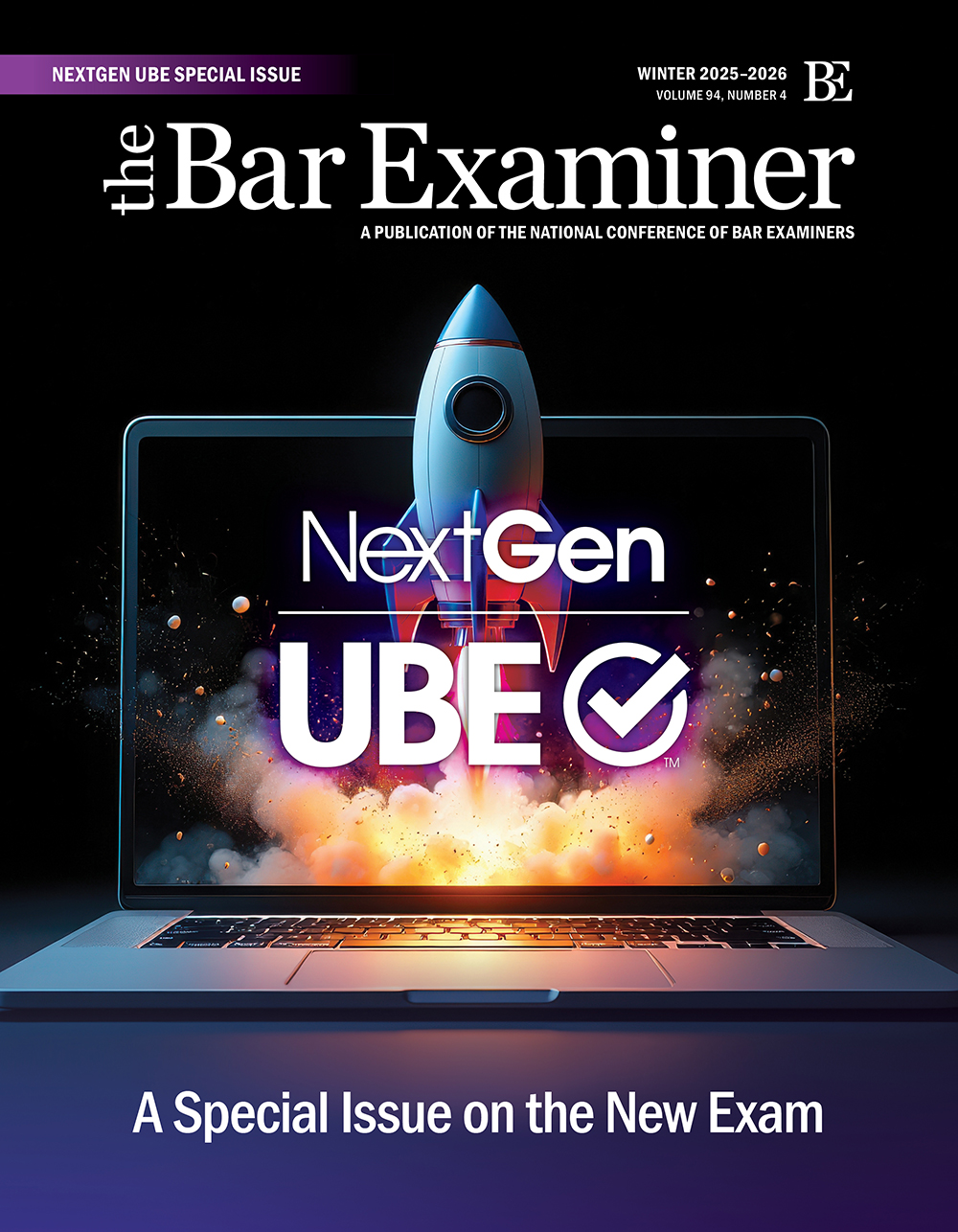This article originally appeared in The Bar Examiner print edition, Spring 2018 (Vol. 87, No. 1), pp 50–54.
By John W. Reed  Editor’s Note: John W. Reed, Thomas M. Cooley Professor of Law Emeritus at the University of Michigan Law School, longtime chair of NCBE’s Multistate Bar Examination Evidence Drafting Committee, and five-time keynote speaker at NCBE’s Annual Bar Admissions Conferences between the years 2004 and 2014, passed away on March 6, 2018. Below is a reprint of Professor Reed’s keynote address from NCBE’s Annual Bar Admissions Conference held on April 28–May 1, 2011, in San Francisco, California. See this issue’s remembrance of Professor Reed.
Editor’s Note: John W. Reed, Thomas M. Cooley Professor of Law Emeritus at the University of Michigan Law School, longtime chair of NCBE’s Multistate Bar Examination Evidence Drafting Committee, and five-time keynote speaker at NCBE’s Annual Bar Admissions Conferences between the years 2004 and 2014, passed away on March 6, 2018. Below is a reprint of Professor Reed’s keynote address from NCBE’s Annual Bar Admissions Conference held on April 28–May 1, 2011, in San Francisco, California. See this issue’s remembrance of Professor Reed.
I am honored by the invitation to speak at this annual conference yet once more, although as quite possibly the oldest person here, I may not be the right person to help us look ahead. I am one of the “old dogs” of which Erica Moeser spoke in her column in the Conference’s Bar Examiner magazine last November, and it’s commonly said that you cannot teach an old dog new tricks; but there are some tricks that only an old dog knows. I must remind you, however, that although wisdom is said to come with age, age sometimes comes alone.
This seems a bit early for a speech, especially if, like me, you were awake in the middle of the night to see the telecast of the royal wedding. It was wonderful to hear beautiful language so elegantly spoken. The manner of one’s speaking can enhance meaning. Indeed, pronunciation can even change meaning. I recall the two Jewish ladies visiting over coffee, when one, looking at a newspaper, said, “This article about a disease called ‘herps’—what’s ‘herps’?” “I don’t know,” said her friend. “Why don’t you look it up?” Returning from her dictionary, the first lady said, “Well, first of all, we’re mispronouncing it. It’s pronounced ‘herpes.’ But not to worry, it’s a disease of the gentiles.”
For you to be subjected to a speech the first thing in the morning like this is akin to starting the day with a cold shower, particularly when the listed title is serious, such as “keynote address.” And that is the charge I have been given—no particular subject matter, just deliver the keynote speech. The term “keynote” brings to mind the long, often banal oratory at political conventions. Like many of you, when I hear “keynote,” I think of Bill Clinton’s much-lampooned speech at the 1988 Democratic Convention in Atlanta as the archetype. But like many of you, I would be mistaken. Governor Clinton’s long speech was not a keynote speech but rather the nominating speech for Governor Michael Dukakis; and it went on so long that the biggest cheers it received were when he said “In conclusion . . . .” However mistakenly, that speech has given “keynote” a bad connotation.
And as for length, I recall an episode that took place at Yale Divinity School in the homiletics class of the renowned Halford Luccock. Giving a practice sermon, a student went on and on—much too long. Professor Luccock noticed a Band-Aid on the student’s face and at the end asked about it. The student said, “While I was shaving this morning, I was thinking about my sermon and cut my chin.” “Next time,” said Luccock, “think about your chin and cut your sermon.”
In any event, sounding a keynote for this 2011 bar admissions conference is difficult if one adheres to the classic definition, especially if it is to be kept short. A keynote address, says Webster’s dictionary, is “an address designed to present the issues of primary interest to an assembly . . . and often to arouse unity and enthusiasm.” A quick look at the conference program, however, reveals that there are too many issues of interest to fit into a breakfast keynote presentation; and while I might or might not be able to arouse some enthusiasm for those issues, I’m sure I’m not capable of arousing the unity of which Webster’s speaks. Instead, I want to speak more generally about our roles in the legal profession and the environment in which we perform those roles.
If I were required to attribute one characteristic to the world around us, I would be tempted to choose uncertainty—uncertainty in matters ranging from the global to the personal:
- uncertainty in the physical world, as climates change, natural resources are consumed, and populations crowd the planet
- uncertainty in the international sphere, as tensions and rebellions and wars pop up like mushrooms after rain
- uncertainty in the nation, as competing visions of the American future clash
- uncertainty in our profession, buffeted by economic and technological changes and by significant philosophical differences
And I dare mention the probability that all of us face significant uncertainties also in our own personal lives.
An interesting small evidence of all that uncertainty is an item in the January Atlantic reporting that someone (obviously someone with too much time on his hands) had counted how many times the word “uncertainty” appeared in the pages of the New York Times and found that from 2007 to 2010 its appearance increased by 44 percent.
You and I are laborers in the legal vineyard, not only as participants in the admission process but also, of course, in our “other lives” as judges, practicing lawyers, teachers, administrators. And we labor in a changed and still changing profession with an uncertain future—a profession that faces numerous challenges and temptations that all of us have rehearsed time and again. You know the litany well:
- instability of law firms, as whole practice groups migrate from firm to firm
- less mentoring of younger lawyers
- the decline of long-term, deep relationships with clients
- beauty contests for new representation
- disrespect of longtime partners
- enormous disparities in partnership profits between rainmakers and other partners
- increased specialization
- unbundling of legal services, with some assigned to nonlawyers and some to computers
- globalization of law practice
- the effect of technology on the way law is practiced
- the displacement of the civil trial by alternative modes of dispute resolution such as arbitration (which reminds me that someone defined “arbitrator” as a cook who leaves Arby’s to work at McDonald’s)
In addition to these familiar issues in the profession, there are new uncertainties in the law school universe, which, by the way, is expanding, with new schools (some of them online) being born as if there were a new Big Bang. Particularly in this time of lessened employment opportunities, we hear renewed suggestions that there are too many lawyers, with the implication that there are too many law schools and too many law students and that we admit too many of them to the bar. The perception that there are too many lawyers seems strongest among those who are already lawyers. It recalls the bumper sticker that says, “Everyone who favors abortion has already been born.”
Let me read you a statement by the dean of Stanford University Law School, just down the road from where we are gathered:
We have more lawyers today than there is any legitimate need for. The truth is that we are simply being swamped with aspiring young lawyers, most of whom will[,] necessarily and within a few years after admission, drift into real estate, insurance and related lines, and that is not a process calculated to help the reputation of our profession.
That Stanford dean was Marion Kirkwood, and he was speaking in 1927, when the California bar numbered 8,000, not 170,000 as today. Whether there are too many lawyers is a speech for another day. Suffice it to say that many of us would oppose a managed economy in which some agency determines how many citizens should be allowed to enter any field of endeavor.
Of more immediate importance to us here, the ABA and the Association of American Law Schools (AALS) and other entities are at odds over the content and length and cost of the educational programs that bring aspiring lawyers to the bar examination room. As the rhetoric heats up, the AALS ominously warns that the ABA’s possible changes of accreditation standards will seriously weaken the exemplary American model of legal education. The odds are that at least some of those changes will be made. (Speaking of odds, I recall Garrison Keillor’s statement about single life in Lake Wobegon. He said, “The odds are good but the goods are odd.”)
To these developments other changes will surely be added, some benign, some not. I don’t know, of course, what the changes will be. Prophets often get it wrong. You never see the headline, “Psychic Wins Lottery.” It is certainly legitimate, however, to look at trends and imagine what our profession will be if those trends continue. But I’m an interventionist. I firmly believe that an apparent course of events can be changed when talented and committed individuals and groups intervene on the side of the public good.
Whatever our roles in the profession, we are confronted with these and other changes and challenges. A common role has brought us together here: our role as gatekeepers to the profession. We are prepared to attend to the process by which individuals are deemed qualified to enter that profession. But the larger question hovers over all we do: What is the future of that profession for which we are doing the screening? And the answer is clear: It depends on us who are its members. In our roles as judges and lawyers and teachers and administrators, we are part and parcel of that now turbulent profession, and all of us have the obligation to make sure that our own conduct in that profession models its highest aspirations, because what we are and do is what the legal profession is and is becoming.
I think we all tend to see the task of modeling the profession as daunting, and beyond our abilities and meager energies. The forces of society and history often appear irresistible, and the temptation is to give in to what seems to be inevitable, however unappealing it may be. I concede that some quests are impossible and quixotic, but not as many as we may think. Most problems are solved, most barriers are surmounted, most opportunities are realized by an accumulation of little acts. We achieve our greatest purposes by attending faithfully to the smallest things.
There are times, of course, when this doesn’t feel true. We practice law and we live our lives in the shadow of gigantic social and economic and political systems and the endless grinding on of history that takes no notice of us. Isn’t it then absurd and pathetically self-important—delusional, even—to think that the little efforts of our little lives make any meaningful difference at all?
The poet Bonaro Overstreet suggested an answer to that question. Originally she entitled her poem “To One Who Doubts the Worth of Doing Anything Because You Can’t Do Everything,” but she ended up calling it “The Stubborn Ounces”:
You say the little efforts that I make
will do no good: they never will prevail
to tip the hovering scale
where justice hangs in balance.
I don’t think I ever thought they would.
But I am prejudiced beyond debate
in favor of my right to choose which side
shall feel the stubborn ounces of my weight.
The truth is that the small things we do can make massive differences in the end. Some years ago on a sidewalk in Johannesburg, South Africa, a man did a very small thing. Trevor Huddleston, a white Anglican priest, walked by a black woman and her little boy, and he tipped his hat. That’s all. But that simple little courtesy was almost never offered to black South Africans by whites, and the little boy noticed. He and his family started going to Huddleston’s church, where they learned more about the love of God for all people equally. The boy was Desmond Tutu, who followed Trevor Huddleston into the priesthood and joined his own witness to the witness of many others, resulting at last in the end of apartheid and the democratic birth of a new nation. Desmond Tutu has said that one seed of that great transformation was the tiniest witness of a tipped hat. We must not, you and I, withhold the stubborn ounces of our weight.
One person who was among us is a shining instance of the power of example of which I speak. Until
his untimely death last August, James K. Robinson was a member and for years chair of NCBE’s Evidence Drafting Committee for the MBE. Among his stellar credentials was his service as Assistant Attorney General in charge of the Criminal Division during the Clinton administration, and the Justice Department held a memorial service for Jim in the department’s Great Hall—only the second time such a service had been held there. One of the speakers at the service was James Comey, a former Deputy Attorney General, and I want to read to you excerpts from his remarks that are a pointed admonition to us all:
How do institutions get shaped . . . ? A certain amount by speeches, . . . [b]ut overwhelmingly by watching [what people actually do].
. . . [B]y far the larger share [of] how you ended up where you are today—and how I ended up as I am today—was watching. Watching. My parents. My siblings. My teachers. My coaches. My friends. Looking around me and watching what they did and being shaped by it. . . .
. . . Jim Robinson was one of the “watched.” . . .
To the extent that we are honest in this institution, decent, caring, demanding, funny, humble—we are that way, sure, because people told us to be—but more than that, we are that way because we watched people like Jim Robinson. And we were shaped by it. . . .
Of course [he] said all the right things, but his gift to this institution was that he lived right; he carried “right”; he was right. And everyone who ever laid eyes on the man read it in his face, in his actions. . . . The kids watched [him], and they were shaped by him. . . .
So thank you, Jim Robinson, for letting us watch. . . . May we never forget what you were, and never stop trying to be you. . . .
That was a moving tribute to a lawyer who was the embodiment of the profession’s ideals, and a powerful reminder about how institutions are shaped.
You and I are watched. You are watched by young associates, by clients, by clerks, by adversaries, by jurors, by judges, by community leaders, by the public at large. I am watched especially by students, who are the lawyers of tomorrow. What do the watchers learn from us about lawyers, about the institution known as the legal profession? What do the watchers learn from us about the importance of a high moral vision of justice and how to realize it?
I submit that the future of our profession depends heavily on what the watchers see in us. In that view, it’s clear that we worry too much about the “to do” list when we ought to worry about the “to be” list. And so I beseech you to be keenly aware of the fact that as you and I are, so will be the future character of this noble and essential profession.
Contact us to request a pdf file of the original article as it appeared in the print edition.








